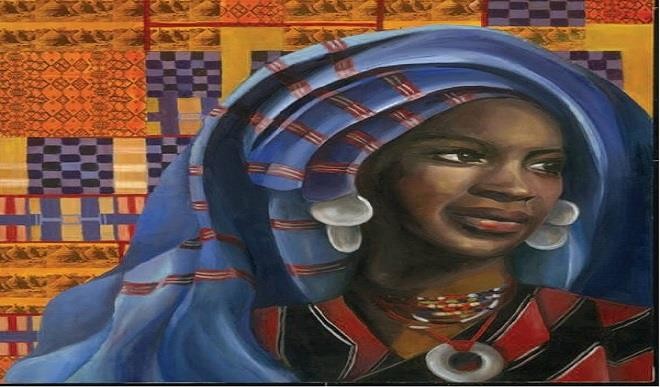
In continuation of our Islamic heritage series, we return home today, to spotlight on a pioneer in the field of women’s education and enlightenment. While the debate rages, on the importance of girl-child education these days, it is instructive to know that more than 200 years ago, the Sokoto Caliphate prioritized women’s education and put mechanisms in place in order to achieve it. The leader of this educational revolution was the daughter of the founder of the Caliphate, Asma’u Bint Usman Dan Fodio, better known as Nana Asma’u.
Nana Asma’u (1793-1864) was a princess, poet, teacher, and daughter of Sheikh Usman dan Fodio. She remains a revered figure in northern Nigeria. She is held up by some as an example of education and independence of women possible under Islam, and by others as a precursor to modern feminism in Africa.
Nana Asma’u was born some 11 years before the 19th century Fulani jihad, and was named after Asma bint Abi Bakr, a companion and sister- in-law of Prophet Muhammad SAW. The daughter of the Sufi-inspired and Fule-led Sokoto Caliphate’s founder and half-sister of Muhammad Bello (the second Sultan of Sokoto), she outlived most of the founding generation of the Caliphate, making her an important source of guidance to its later rulers. From 1805, members of the Caliph’s family came to great prominence, including the Caliph’s female relatives. While Nana Asma’u became the most prominent, her sisters Maryam and Fatima, and the Caliph’s wives Aisha and Hawwa played major literary and political roles in the new state. Like her father, she was educated in Qur’anic studies, and placed a high value upon universal education. As exemplars of the Qadiriyyah Sufi school, Sheikh dan Fodio and his followers stressed the sharing of knowledge, especially that of the Sunnah, which is the personal examples of Prophet Muhammad SAW. To learn without teaching, they thought, was sterile and empty. Thus Nana Asma’u was devoted, in particular, to the education of Muslim women. Like most of the rest of her family, she became a prolific author.
Writer and counsellor
Well educated in the classics of the Arab and Classical world, and well versed in four languages (Arabic, the Fula language, Hausa and Tamacheq Tuareg), Nana Asma’u had a public reputation as a leading scholar in the most influential Muslim state in West Africa, which gave her the opportunity to correspond broadly. She witnessed many of the wars of the Fulani jihad and wrote about her experiences in a prose narrative Wakar Gewaye, “The Journey”. As the Sokoto Caliphate began as a cultural and religious revolutionary movement, the writings of its leaders held a special place by which later generations, both rulers and ruled, could measure their society. She became a counselor to her brother when he took the Caliphate, and had been recorded writing instructions to governors and debating with the scholars of foreign places.
Poet
Among her more than 60 surviving works written over 40 years, Nana Asma’u left behind a large body of poetry in Arabic, the Fula language and Hausa, all written in the Arabic script. Many of these are historical narratives, but they also include elegies, laments, and admonitions. Her poems of guidance became tools for teaching the founding principles of the Caliphate. Asma’u also collaborated closely with Muhammad Bello, the second Caliph. Her works include and expand upon the dan Fodio’s strong emphasis on women leaders and women’s rights within the community ideals of the Sunnah and Islamic law.
Women’s education
Some of her surviving written works are related to Islamic education: for much of her adult life she was responsible for women’s religious education. Starting around 1830, she created a cadre of women teachers (jajis) who travelled throughout the Caliphate educating women in the students’ homes. In turn, each of these jajis used Nana Asma’u’s and other Sufi scholars writings, usually through recited mnemonics and poetry, to train corps of learned women, called the ’yan-taru, or “those who congregate together, the sisterhood.” To each jaji she bestowed a malfa (a hat and traditional ceremonial symbol of office) tied with a red turban. The jajis became, thus, symbols of the new state, the new order, and of Islamic learning even outside women’s community. In part, this educational project began as a way to integrate newly conquered pagan communities into the Muslim ruling class. It expanded, though, to include the poor and rural, training teachers who travelled across the sprawling Caliphate to educate others.
Contemporary legacy
Nana Asma’us continued legacy rests not just in her literary work and the role she played in defining the values of the Sokoto Caliphate. Today in Northern Nigeria, Islamic women’s organisations, schools, and meeting halls are commonly named after her. She re-entered the debate on the role of women in Islam in the 20th century, as her legacy has been carried by Islamic scholars and immigrants to Europe and its academic debates. The republishing and translation of her works has brought added attention to the purely literary value of her prose and poems.
With additional information from Wikipedia.

 Join Daily Trust WhatsApp Community For Quick Access To News and Happenings Around You.
Join Daily Trust WhatsApp Community For Quick Access To News and Happenings Around You.


